Prime Minister Abe in Brussels (No.52)
Belgians’ views on religion are changing greatly. Recently the American Institute of Public Opinion conducted a survey on religion in 65 countries. It was shown that many Belgians considered “religion to exercise a bad influence on society”. In Europe scepticism towards religion’s influence in society has become rapidly widespread. Particularly in Denmark, Belgium and France scepticism vastly outweighs the opinion in favour of religion. Looking at the whole world, we can see that the countries that regard religion as positive the most are the African countries, followed by the Americas, the Middle-East and the Asian countries. In the bottom of the ranking we find Western Europe with 36% in favour and 32% sceptical of religion. The survey also broke down the answers according to religion and occupation. According to those results, Muslims held the highest positive opinion on religion’s influence on society; the most negative were the Hindus. More sceptics were found by people in an intellectual occupation. Especially holders of a doctoral degree had an overwhelmingly negative opinion. In fact, according to a survey on the degree of religious followers by country conducted by the same institute two years ago, 59% of Belgians said to follow a certain religion (Christianity etc.). Although the majority still have a religious faith, it is in a net decline. Perhaps this shows that Belgians, who are sceptical towards the social impact of religion, might be holding this opinion towards other religions rather than Christianity. By the way, in Japan’s case only a mere 16% say to have a religious faith. 31% says to be atheist (8% in Belgium) and surprisingly a staggering 23% say they are unable to give an answer (7% in Belgium). As you can see, the number of people in Japan who have negative views about the influence of religion on society is overwhelmingly large.
<Prime Minister Abe and NATO>
Last week as his last stop on his tour around six European countries Prime Minister Abe visited Brussels. The Prime Minister stayed for just a day and a half, but in that time had a busy schedule talking to the Secretary-General of NATO and EU leaders, having an audience with King Philippe of Belgium, and talking with Prime Minister Di Rupo. An appointment at the NATO headquarters was first on the list, straight from the airport, in a frenzy of activity. Secretary-General Rasmussen visited Japan in April last year to meet with Prime Minister Abe and this time around they met again. In their talk they discussed a wide array of topics ranging from the future co-operation between Japan and NATO to the current situation in the Ukraine. Immediately after that, the Individual Partnership and Cooperation Programme (IPCP) outlining the partnership between Japan and NATO was signed. Furthermore Prime Minister Abe gave a speech at the North Atlantic Council followed by a more than thirty-minute question-and-answer session for the permanent representatives of the 28 NATO countries. Each country expressed their understanding and support for Japan’s new security policy. In the midst of the aggravating situation in the Ukraine, NATO moves its focus again on the regional defence which is its primary duty, and sympathizes in the same way with Japan, that is strengthening its own defence efforts.
<Prime Minister Abe and Belgium>
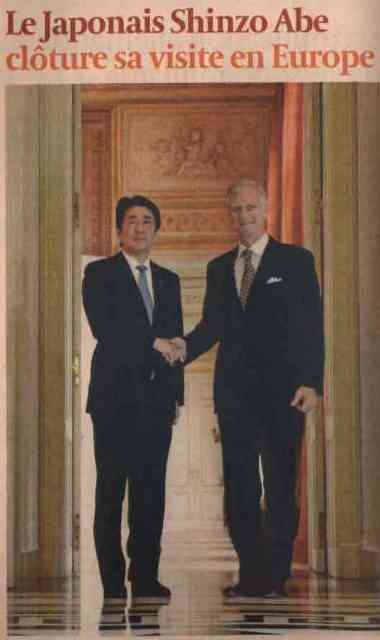 That same day in the evening, Prime Minister Abe visited the Royal Palace of Laeken on the northern edge of Brussels to have an audience with King Philippe. As it was just a meeting between the two, I had to remain in the anteroom for about 30 minutes. Going back to before he became Crown Prince, King Philippe has visited Japan at least nine times, most recently two years ago in June when he led the economic mission to Japan. During the meeting many topics were discussed, including the exchanges between the Royal Family of Belgium and Japan’s Imperial Household. The following day in the afternoon Prime Minister Abe had a meeting with Prime Minister Elio Di Rupo. Up to now, both heads of government had talked briefly to each other on the fringe of international conferences, but it was the first time to formally sit down and talk. It was a brief meeting of 45 minutes, but I think it was a meaningful exchange of views, ranging from the political and security dialogue to economic and cultural exchanges, strengthening the relationship between both countries. In the end after having finished all formalities, during a very short time, Prime Minister Abe and his wife took a walk about the Grand Place, Belgium’s most famous touristic spot. Personally I would have liked that they would have taken their time to appreciate the UNESCO World heritage buildings, but as soon as they made their way to the Grand Place, they were surrounded by many tourists who kept asking to have their pictures taken together. Prime Minister Abe is a popular figure and I understood it was simply impossible for him to leisurely go sight-seeing, unless in disguise. That same day in the evening, Prime Minister Abe visited the Royal Palace of Laeken on the northern edge of Brussels to have an audience with King Philippe. As it was just a meeting between the two, I had to remain in the anteroom for about 30 minutes. Going back to before he became Crown Prince, King Philippe has visited Japan at least nine times, most recently two years ago in June when he led the economic mission to Japan. During the meeting many topics were discussed, including the exchanges between the Royal Family of Belgium and Japan’s Imperial Household. The following day in the afternoon Prime Minister Abe had a meeting with Prime Minister Elio Di Rupo. Up to now, both heads of government had talked briefly to each other on the fringe of international conferences, but it was the first time to formally sit down and talk. It was a brief meeting of 45 minutes, but I think it was a meaningful exchange of views, ranging from the political and security dialogue to economic and cultural exchanges, strengthening the relationship between both countries. In the end after having finished all formalities, during a very short time, Prime Minister Abe and his wife took a walk about the Grand Place, Belgium’s most famous touristic spot. Personally I would have liked that they would have taken their time to appreciate the UNESCO World heritage buildings, but as soon as they made their way to the Grand Place, they were surrounded by many tourists who kept asking to have their pictures taken together. Prime Minister Abe is a popular figure and I understood it was simply impossible for him to leisurely go sight-seeing, unless in disguise.
<Descendants of the First Belgian Diplomat in Japan in the Late Tokugawa Period>
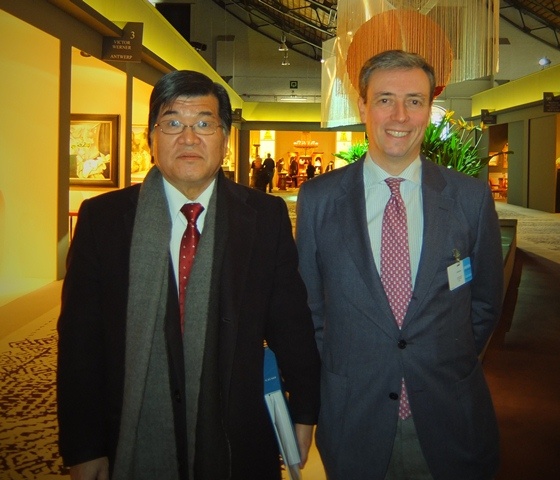  In Ambassador’s Chat No. 29, I introduced August T’Kint de Rodenbeke, specialist of Trade Policy, who visited Japan to negotiate the Treaty of Amity, Commerce and Navigation between Belgium and Japan on behalf of the Belgian government at the end of the Edo-period 150 years ago. After concluding negotiations in 1866, Mr T’Kint was appointed as the first Minister Extraordinary and Plenipotentiary to Japan. A few months ago, purely by coincidence, I met with the organiser of BRAFA, an antique arts exhibition held in Brussels, who happened to have the same surname as Mr T’Kint de Rodenbeke. Therefore I suspected he perhaps was related and asked him about it at the venue (Ambassador’s Chat No. 42). Unfortunately he didn’t know this Mr August T’Kint who conducted trade negotiations with Japan, but from his father who was familiar with the family genealogy I received confirmation that there definitely was a man named August in the family who went to Japan for diplomatic negotiations. In Ambassador’s Chat No. 29, I introduced August T’Kint de Rodenbeke, specialist of Trade Policy, who visited Japan to negotiate the Treaty of Amity, Commerce and Navigation between Belgium and Japan on behalf of the Belgian government at the end of the Edo-period 150 years ago. After concluding negotiations in 1866, Mr T’Kint was appointed as the first Minister Extraordinary and Plenipotentiary to Japan. A few months ago, purely by coincidence, I met with the organiser of BRAFA, an antique arts exhibition held in Brussels, who happened to have the same surname as Mr T’Kint de Rodenbeke. Therefore I suspected he perhaps was related and asked him about it at the venue (Ambassador’s Chat No. 42). Unfortunately he didn’t know this Mr August T’Kint who conducted trade negotiations with Japan, but from his father who was familiar with the family genealogy I received confirmation that there definitely was a man named August in the family who went to Japan for diplomatic negotiations. 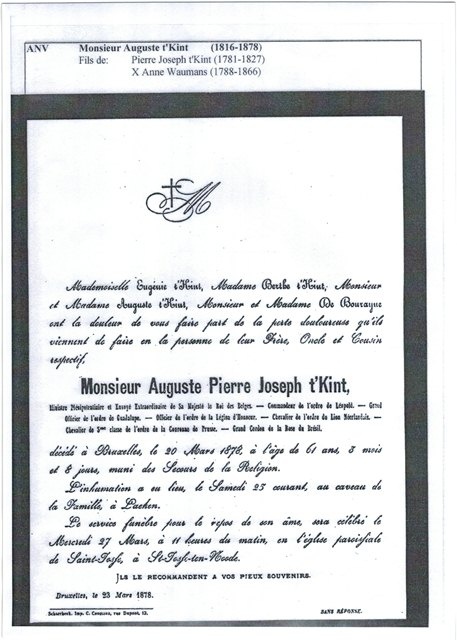 Then, as proof, he sent me a copy of the mourning card of Mr T’Kint de Rodenbeke who died at the age of 61 in 1878 (his occupation in Japan was also mentioned). Attached to this email, to my surprise, it was explained that the family of the first Minister to Japan, August, and BRAFA organiser, Harold T’Kint de Rodenbeke have a common ancestor dating back to the mid-15th century as the family has been complexly derived and branched off. It appears August T’Kint de Rodenbeke belongs to the family line that settled in Antwerp and had three siblings. He however lived an unmarried life and thus had no direct descendants. As someone who searched for the offspring of the first Belgian diplomat to Japan, I could not help but feel disappointed. Nevertheless I am deeply impressed knowing the fact that in Belgium a family of noble lineage is carefully conserved through its own family line dating back several centuries. Then, as proof, he sent me a copy of the mourning card of Mr T’Kint de Rodenbeke who died at the age of 61 in 1878 (his occupation in Japan was also mentioned). Attached to this email, to my surprise, it was explained that the family of the first Minister to Japan, August, and BRAFA organiser, Harold T’Kint de Rodenbeke have a common ancestor dating back to the mid-15th century as the family has been complexly derived and branched off. It appears August T’Kint de Rodenbeke belongs to the family line that settled in Antwerp and had three siblings. He however lived an unmarried life and thus had no direct descendants. As someone who searched for the offspring of the first Belgian diplomat to Japan, I could not help but feel disappointed. Nevertheless I am deeply impressed knowing the fact that in Belgium a family of noble lineage is carefully conserved through its own family line dating back several centuries.
<A Belgian Importer and Distributor of Japan-made Tractors and Forklifts>
 You often see Japanese agricultural and construction machinery by Kubota and Kom’atsu being used on worksites in Belgium. However, neither company has their own local sales point in Belgium. So I had been wondering how their equipment was being sold here, and recently, the mystery was solved. There are sales distributor networks in Belgium specialising in agricultural machinery such as BIA Group and Matermaco Group. I got acquainted with the managing directors of these groups and was able to visit their head offices. The Matermaco Group (under the umbrella of the Dutch Mechangroup Corporation; 70 employees) has its main office in Gembloux (44km south-east of Brussels with a population of 23,700) where they started selling Kubota equipment from 1976 and Komatsu equipment from 1978 on.yomoyama_052_kubota2 You often see Japanese agricultural and construction machinery by Kubota and Kom’atsu being used on worksites in Belgium. However, neither company has their own local sales point in Belgium. So I had been wondering how their equipment was being sold here, and recently, the mystery was solved. There are sales distributor networks in Belgium specialising in agricultural machinery such as BIA Group and Matermaco Group. I got acquainted with the managing directors of these groups and was able to visit their head offices. The Matermaco Group (under the umbrella of the Dutch Mechangroup Corporation; 70 employees) has its main office in Gembloux (44km south-east of Brussels with a population of 23,700) where they started selling Kubota equipment from 1976 and Komatsu equipment from 1978 on.yomoyama_052_kubota2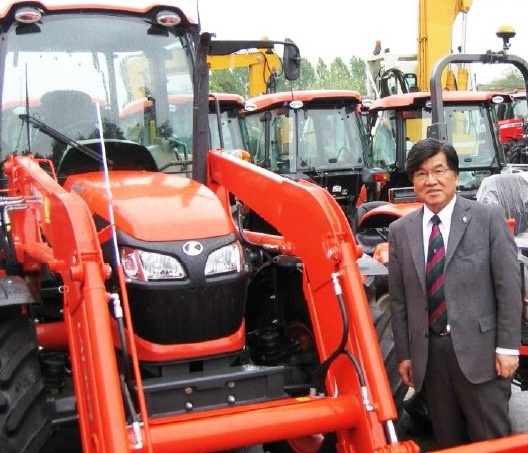 yomoyama_052_kubota2The market share of Japanese products, including products such as Yanmar, makes up over 30% of the total turnover (about 49 million euros in 2013). The group is basically geared towards conducting its business in Belgium. Their competitor BIA Group however has spread its business throughout many francophone African countries. According to managing director Serge de Liedekerke of the Matermaco Group, the difficult aspects the distributors face are the technical training of the persons in charge of sales, and securing necessary parts and personnel for maintenance. Rather than having to set up their own sales network, concluding contracts with local distributors is more cost-effective and convenient from the Japanese companies’ point of view. I must say, Japan-Belgian business relations are becoming more and more profound in this aspect as well. yomoyama_052_kubota2The market share of Japanese products, including products such as Yanmar, makes up over 30% of the total turnover (about 49 million euros in 2013). The group is basically geared towards conducting its business in Belgium. Their competitor BIA Group however has spread its business throughout many francophone African countries. According to managing director Serge de Liedekerke of the Matermaco Group, the difficult aspects the distributors face are the technical training of the persons in charge of sales, and securing necessary parts and personnel for maintenance. Rather than having to set up their own sales network, concluding contracts with local distributors is more cost-effective and convenient from the Japanese companies’ point of view. I must say, Japan-Belgian business relations are becoming more and more profound in this aspect as well.
<A Japanese Garden at a Belgian Home>
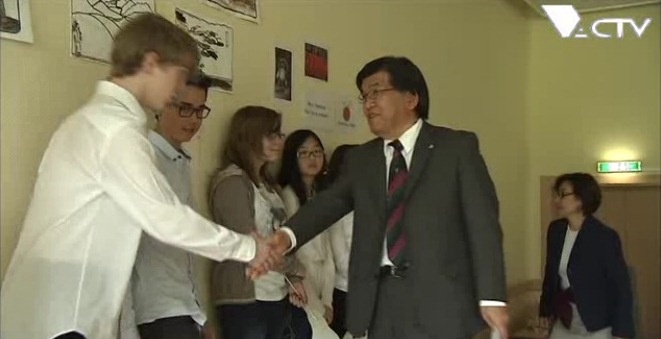 In Morlanwelz, a small town (18,900 inhabitants) about 55km south of Brussels, there is a prestigious school called the “Athénée de Morlanwelz” where Belgium’s current Prime Minister Di Rupo as well once spent his middle and high school years. At the end of last month I was invited by the school to its school festival for the commemoration of the opening of the school and I attended a presentation of students learning Japanese. The presentation was attended by not only the school’s principal, but also by the provincial governor and the mayor. In front of a large number of parents, seven high school students performed dialogues and short skits in the Japanese language. As Japanese is not part of the regular curriculum, a group of interested students are learning it from a local volunteer teacher during their lunch break. Having started out with about 20 students at the beginning of the school year, more than half have dropped out by the end of the school year. The motivation to learn Japanese is, as expected, the interest in Japanese manga. In Morlanwelz, a small town (18,900 inhabitants) about 55km south of Brussels, there is a prestigious school called the “Athénée de Morlanwelz” where Belgium’s current Prime Minister Di Rupo as well once spent his middle and high school years. At the end of last month I was invited by the school to its school festival for the commemoration of the opening of the school and I attended a presentation of students learning Japanese. The presentation was attended by not only the school’s principal, but also by the provincial governor and the mayor. In front of a large number of parents, seven high school students performed dialogues and short skits in the Japanese language. As Japanese is not part of the regular curriculum, a group of interested students are learning it from a local volunteer teacher during their lunch break. Having started out with about 20 students at the beginning of the school year, more than half have dropped out by the end of the school year. The motivation to learn Japanese is, as expected, the interest in Japanese manga.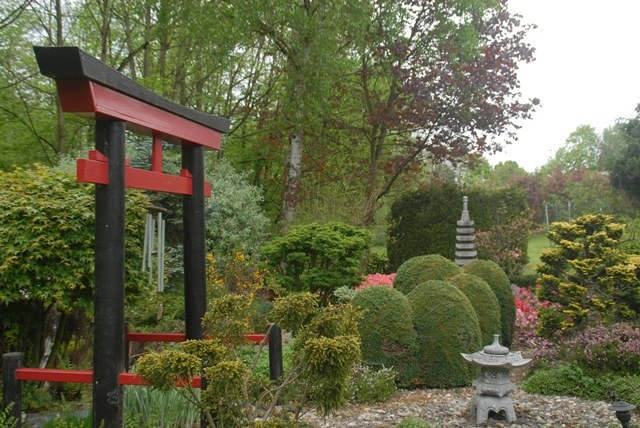 This volunteer teacher is Mr Jean-Pierre Miloen, a former music teacher at the Athénée de Morlanwelz. Upon his retirement he started teaching Japanese, partly acquired through self-study, to students. After the presentation I was invited to his home about 10km away, which to my surprise had a vast Japanese garden. Even more surprising, he had created this garden himself by consulting specialised books on Japanese gardens. He frequently travels to Japan with his wife and they had just returned from a two-week visit. Laughing that they hadn’t recovered fully from jet lag yet, they shared their travel stories with me. It is a happy surprise to find an enthusiastic “Japan fan” like Mr Miloen in the remote countryside of Belgium. This volunteer teacher is Mr Jean-Pierre Miloen, a former music teacher at the Athénée de Morlanwelz. Upon his retirement he started teaching Japanese, partly acquired through self-study, to students. After the presentation I was invited to his home about 10km away, which to my surprise had a vast Japanese garden. Even more surprising, he had created this garden himself by consulting specialised books on Japanese gardens. He frequently travels to Japan with his wife and they had just returned from a two-week visit. Laughing that they hadn’t recovered fully from jet lag yet, they shared their travel stories with me. It is a happy surprise to find an enthusiastic “Japan fan” like Mr Miloen in the remote countryside of Belgium.
|